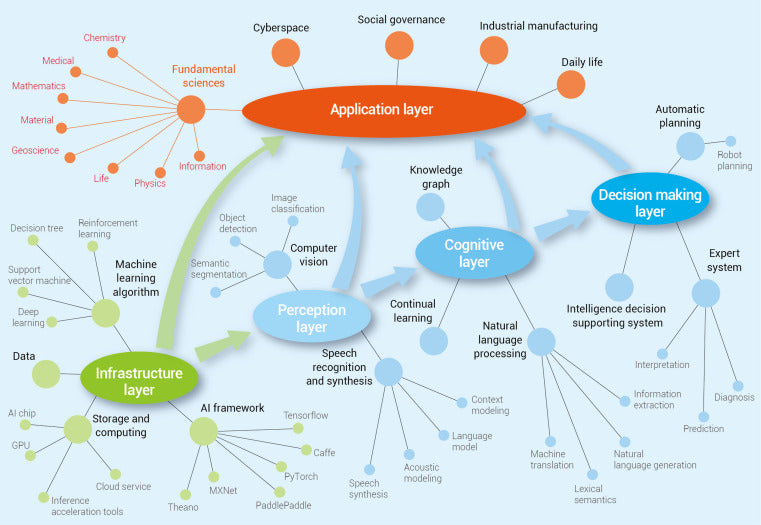To harness our collective biologic and artificial knowledge and compensate for undesirable biases in organizations, we can follow a multi-faceted approach that combines various disciplines to create applications that foster ethical decision-making and maximize future opportunities.
To use our collective knowledge of the natural and social sciences to detect and compensate for undesirable organizational thinking, social norms, and biases, and to develop applications that use best practices from various disciplines, we can follow a multi-disciplinary approach.
By following this multi-step approach, organizations can tap into the collective knowledge of various disciplines, effectively address biases, and ethically maximize their future options to create better lives for their members.
Here are some steps to achieve these goals:
Interdisciplinary collaboration
Encourage collaboration between experts in neuroscience, psychology, philosophy, physics, and other relevant fields to develop a comprehensive understanding of the factors that influence organizational decision-making and behavior.
This interdisciplinary approach can provide insights that enable organizations to better understand and address biases and undesirable thinking.
Encourage collaboration between experts, other relevant stakeholders and interested communities.
This will foster the exchange of ideas and promote the development of well-rounded, unbiased solutions.
Data-driven decision-making
Use data and analytics to identify and monitor the presence of biases and assess the effectiveness of implemented strategies.
Employ advanced data analysis techniques, machine learning, and artificial intelligence to uncover hidden patterns and provide actionable insights.
Continuous learning and development
Organizations should invest in the ongoing education of their employees, providing them with access to resources, workshops, and training programs that cover various disciplines and perspectives.
Stay updated with the latest research and findings in relevant fields.
Cultivate diversity and inclusion
Foster a diverse workforce and inclusive environment to ensure that multiple perspectives are represented.
This will help to combat biases and promote innovative thinking.
Encourage diversity in hiring and decision-making processes, as diverse perspectives can help minimize biases and promote innovative thinking.
Foster an inclusive environment where all individuals feel valued and respected.
Establish a strong ethical framework
Develop a clear code of ethics that aligns with the organization's values and objectives.
This framework should guide all decisions and actions to ensure that the well-being of employees and stakeholders is prioritized.
Implement bias-awareness training
Educate employees about different types of biases and their impact on decision-making.
This will help individuals recognize their own biases and strive to higher aspirations.
To leverage collective knowledge from various disciplines to detect and compensate for undesirable organization thinking and biases, and to develop applications that promote ethical practices, we can follow a multi-step approach:
Education and training
Develop educational programs and training workshops for organizational leaders and members, focusing on understanding biases and promoting best practices from different fields.
This can help raise awareness and improve decision-making within the organization.
Data-driven analysis
Utilize data analytics and machine learning tools to identify patterns and trends in organizational behavior, decision-making, and biases.
This can help organizations recognize areas that need improvement and design targeted interventions.
Develop applications
Create applications and tools that incorporate the best practices from various disciplines, such as decision-making models from neuroscience and psychology, ethical frameworks from philosophy, and analytical methods from physics.
These applications can help organizations make informed decisions and maximize their future options.
Regular evaluation and feedback
Establish a system for regular evaluation and feedback within the organization, allowing members to voice their concerns and share insights.
This encourages open communication and helps to identify and address biases in real time.
Promote diversity and inclusion
Encourage diversity and inclusion within the organization to ensure a wide range of perspectives and experiences are considered in decision-making.
This can help mitigate cognitive, national, social, political, philosophical, and ideological biases.
Ethical guidelines and policies
Develop and implement clear ethical guidelines and policies that emphasize the importance of unbiased decision-making and adherence to best practices.
This can create a strong foundation for organizations to work towards their goals ethically.
Organizational culture transformation
Drive a cultural shift within the organization that prioritizes critical thinking, open-mindedness, and a commitment to continuous improvement.
This can help create an environment where biases are openly discussed, challenged, and addressed.
Incorporate external perspectives
Engage with external stakeholders, such as customers, partners, and experts from different fields, to gain insights and perspective on organizational practices and potential biases.
This can help broaden the organization's understanding of potential issues and facilitate effective solutions.
Iterative approach
Adopt an iterative approach to organizational development, continuously learning from experiences and implementing changes based on feedback and assessment.
This promotes adaptability and resilience in the face of evolving challenges and opportunities.
Identify and address biases
Utilize research from social sciences to detect cognitive, national, social, political, philosophic, and ideological biases within organizations.
Implement targeted interventions and training programs to raise awareness and mitigate the impact of these biases on decision-making processes.
Develop AI-based tools
Leverage artificial intelligence and machine learning to create applications that can analyze vast amounts of data and identify patterns of biases, while recommending best practices and strategies for improvement.
Promote ethical decision-making: Integrate ethical considerations into organizational processes and decision-making frameworks.
This can be achieved by incorporating ethical guidelines, developing ethical leadership training programs, and fostering an organizational culture that values ethical behavior.

